
Dr. Abdool Karim, MD, PhD, DSc, is a South African epidemiologist and infectious diseases specialist, who is widely recognized for his research contributions in HIV prevention and treatment. He is Director of the Centre for the AIDS Program of Research in South Africa (CAPRISA), and Pro Vice-Chancellor (Research) at the University of KwaZulu-Natal in Durban, South Africa. He is also Professor of Clinical Epidemiology at the Mailman School of Public Health at Columbia University, Adjunct Professor of Medicine at Weill Medical College of Cornell University, and Associate member of the Ragon Institute of Massachusetts General Hospital, Massachusetts Institute of Technology and Harvard University. His contributions to microbicides for HIV prevention spans two decades, most notably culminating in the CAPRISA 004 tenofovir gel trial which provided proof-of-concept that antiretroviral drugs can prevent sexually transmitted HIV infection and herpes simplex virus type 2 in women.

Dr. Baltimore, PhD, is an accomplished researcher, educator, administrator, and public advocate for science and engineering and is considered one of the world’s most influential biologists. After serving as President of the California Institute of Technology (Caltech) for nine years, he was appointed President Emeritus and the Robert Andrews Millikan Professor of Biology in 2006. He shared the Nobel Prize in 1975 for Physiology or Medicine for identifying the enzyme reverse transcriptase in virus particles, providing strong evidence for a process of RNA to DNA conversion. This discovery provided the key to understanding the life cycle of retroviruses such as HIV. In the following years, he has contributed widely to the understanding of cancer, AIDS, and the molecular basis of the immune response. Baltimore has profoundly influenced national science policy on such issues as recombinant DNA research and the AIDS epidemic.
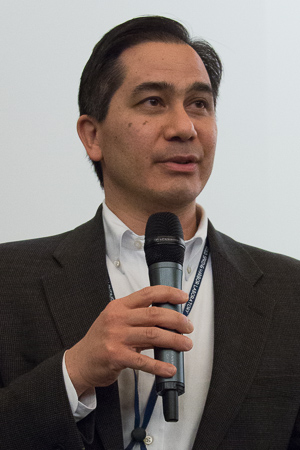
Dr. Barouch, MD, PhD, is currently Chief of the Division of Vaccine Research at Beth Israel Deaconess Medical Center, Professor of Medicine at Harvard Medical School, and a member of the Steering Committee of the Ragon Institute of MGH, MIT, and Harvard. His laboratory focuses on studying the immunology and virology of HIV-1 infection and developing novel vaccine strategies. He has recently demonstrated the therapeutic efficacy of potent monoclonal antibodies and the early seeding of the viral reservoir. He has advanced a series of novel adenovirus vector-based HIV-1 vaccine candidates from concept and design to preclinical testing to phase 1 clinical trials that are currently underway in both the U.S. and sub-Saharan Africa. Dr. Barouch is board certified in Internal Medicine and Infectious Disease, and he is highly committed to teaching students, clinical fellows, research fellows, and junior faculty and to providing clinical care to patients with infectious diseases.

Dr. Barré-Sinoussi, PhD, is a French virologist and director of the Regulation of Retroviral Infections Division at the Institut Pasteur in Paris, France. She performed some of the fundamental work in the identification of the human immunodeficiency virus (HIV) as the cause of AIDS. In 2008, she was awarded the Nobel Prize in Physiology or Medicine, together with her former mentor, Luc Montagnier, for their discovery of HIV. Her collaborations and contributions to AIDS research organizations around the world have brought her recognition by WHO, the UNAIDS-HIV, and the National Agency for AIDS Research in France. She is the President of the International AIDS Society.

Dr. Berger, PhD, is the Chief, Molecular Structure Section, Laboratory of Viral Diseases at the National Institute of Allergy and Infectious Diseases, since 1995. His work with the Intramural Research Program (IRP) has had a major focus on HIV and the development of novel strategies to treat and prevent virus infection. He has won international recognition and many awards for research that is ground-breaking and advances biomedical knowledge.

Dr. Bieniasz, PhD, is an HHMI Investigator and Professor, Head, of the Laboratory of Retrovirology at The Rockefeller University. He is a faculty member in the David Rockefeller Graduate Program and the Tri-Institutional M.D.-Ph.D. Program. His research seeks to define how host gene products influence the replication of retroviruses, with an emphasis on human and primate immunodeficiency viruses.
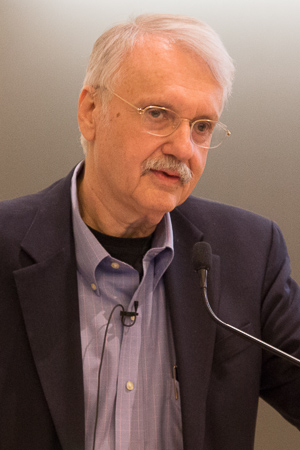
Dr. Broder, MD, is an oncologist and medical researcher. He was a co-developer of some of the first effective drugs for the treatment of AIDS and was Director of the National Cancer Institute (NCI) from 1989 to 1995. During the first years of the AIDS epidemic, he co-developed zidovudine (AZT), didanosine (ddI), and zalcitabine (ddC), which were the first effective drugs licensed for the treatment of AIDS. In 1989, he was appointed by President Ronald Reagan to be Director of the NCI. In this position he oversaw the development of a number of new therapies for cancer including paclitaxel (Taxol). After leaving the NCI, Dr. Broder became Senior Vice President for Research and Development at the IVAX Corporation in Florida, a position he held until 1998 when he joined Celera Genomics. He then joined Intrexon and served in various leadership positions until his appointment as Senior Vice President and Head of Intrexon's Health Sector. He retired from this position in 2016 and will continue as a consultant to the Company.
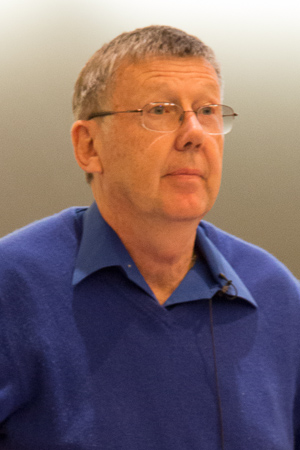
Dr. Burton, PhD, Chairman, Department of Immunology and Microbial Science, Scripps Research Institute, is an immunologist who has made significant contributions to the field of HIV vaccine research. In 1989, he began his career at Scripps trying to make recombinant human antibodies. This research led to his celebrated publication in Science which described his discovery of recombinant antibodies which were made outside of animals. In 2002, the International AIDS Vaccine Initiative (IAVI) named Burton director of its Neutralizing Antibody Consortium, where he continues to lead. Joint appointments include professor at the Kellogg School of Science and Technology at Scripps, and the Ragon Institute of Massachusetts General Hospital, MIT and Harvard. He is also the Director of The Center for HIV/AIDS Vaccine Immunology and Immunogen Discovery (CHAVI-ID) at Scripps.
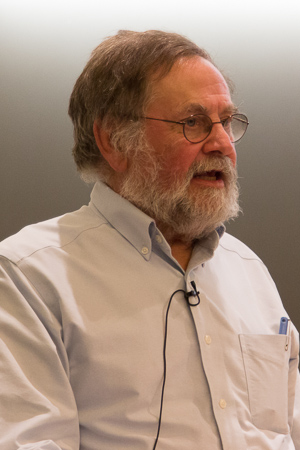
Dr. Coffin, PhD, is a virologist, whose scientific career has been centered on developing an understanding of the association of retroviruses with their hosts. He is American Cancer Society Research Professor of Genetics and Molecular Microbiology at Tufts University in Boston. He is also the director of the HIV Drug Resistance Program of the National Cancer Institute (NCI) and serves as Special Advisor to the Director of the Center for Cancer Research at NCI. He is a member of the National Academy of Sciences (elected in 1999) and a recipient of American Cancer Society professorship. He has advised policy committees at the national level regarding virus-related matters. Coffin was program committee chair for the 18th Conference on Retroviruses and Opportunistic Infections in 2011. He is senior editor of the recently published book Retroviruses, the definitive work in the field.

Jon Cohen is a science writer and reporter. He specializes in biomedicine, and is widely known for his coverage of HIV/AIDS, immunology, vaccines, and global health. He also has reported extensively on genetics, primate research, evolution, bioterrorism, research funding, ethics, reproductive biology, credit battles, and the media itself. Mr. Cohen has written four nonfiction books on scientific topics and is widely published in magazines. He has been a reporter for Science since 1990 and has also written for the New Yorker, Atlantic Monthly, the New York Times Magazine, Smithsonian, Technology Review, Outside, Slate, Surfer and many other publications. His most recent publication is, Tomorrow Is a Long Time: Tijuana’s Unchecked HIV/AIDS Epidemic, (Daylight, 2015) a photo essay book that has an accompanying documentary series on UCTV.

Lawrence Corey, MD, is a physician-scientist and an internationally recognized expert in virology, immunology, and vaccine development. He is a member of the vaccine and infectious disease division and President and Director Emeritus of Fred Hutchinson Cancer Research Center in Seattle, Washington. He also serves as founding director and co-principal investigator of the HIV Vaccine Trials Network. His discoveries over the past 30 years are cited as having deepened the understanding of both the pathogenesis and treatment of diseases caused by viruses, especially human immunodeficiency virus (HIV) and herpesviruses. He has pioneered some of the most significant advances in the creation of safe and effective antivirals for herpes viruses, HIV, and hepatitis infections, the testing of experimental vaccines for HIV and genital herpes, and the designing of new methods for diagnosing and monitoring therapies for viral infections.
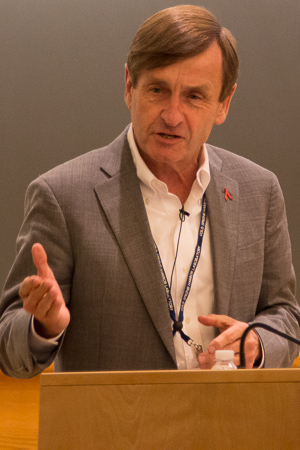
Dr. Curran, MD, MPH, is professor of epidemiology and dean of the Rollins School of Public Health at Emory University. He is an adjunct Professor of Medicine and Nursing, and Co-Director and Principal Investigator of the Emory Center for AIDS Research. He is immediate past chair of the board on Population Health and Public Health Practice of the Institute of Medicine and served on the Executive Committee of the Association of Schools of Public Health. Additionally, he holds an endowed chair known as the James W. Curran Dean of Public Health. Dr. Curran is considered to be a pioneer, leader, and expert in the field of HIV/AIDS. In 1981 Dr. Curran led the task force on acquired immune deficiency syndrome (AIDS) at the Centers for Disease Control and Prevention (CDC) and subsequently led the HIV/AIDS Division. While at the CDC, he attained the rank of assistant surgeon general. Dr. Curran was a pioneer in the field in that he was one of the first scientists to recognize the infectious nature of HIV/AIDS, and he is recognized for fighting the stigmatization of people who are infected with HIV/AIDS.
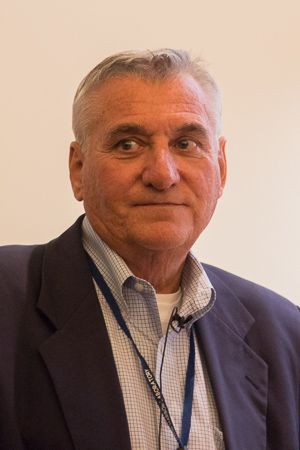
Dr. Desrosiers, PhD, is a virologist whose seminal discoveries at Harvard Medical School fueled scientific hopes of developing a vaccine for HIV/AIDS. He was the leader of the team that discovered the simian immunodeficiency virus in 1984. He moved to the University of Miami in 2013 and was appointed Director of Research Faculty Development and Professor in the Department of Pathology at the Miller School of Medicine. His laboratory is currently researching how individual viral genes contribute to the successful survival strategies employed by persisting viruses. Viruses under study include KSHV, the AIDS virus HIV, and the monkey homologs of these viruses (RRV and SIV). Lessons learned at a basic fundamental level are applied to the quest for an effective vaccine against HIV/AIDS.
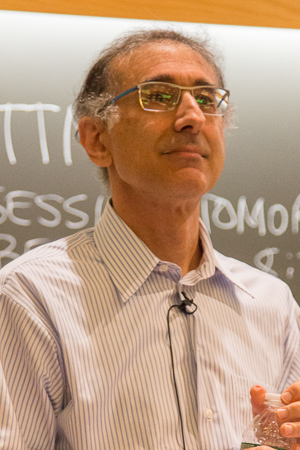
Dr. Emerman, PhD, is the Director of the Molecular and Cellular Biology graduate program at the Fred Hutchinson Cancer Research Center in Seattle, Washington. His research specialties are HIV host cell interactions and the regulatory and structural genes of HIV. Dr. Emerman earned his doctorate in molecular and cellular biology from the University of Wisconsin-Madison in 1986.
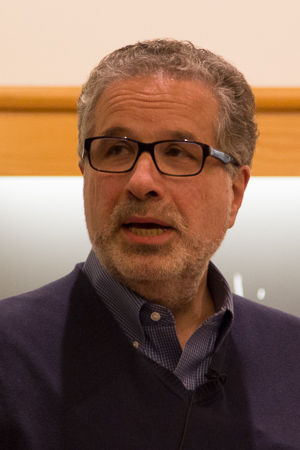
Dr. Emini, PhD, is the Director of the HIV program at the Bill & Melinda Gates Foundation. He is a globally recognized expert in AIDS and vaccines and in 2004 was appointed Senior Vice President and Chief of Vaccine Development at the International AIDS Vaccine Initiative (IAVI). He has also led the research and development of vaccines at Pfizer, one of which was Prevenar 13, as well as others dealing with human papillomavirus and human rotaviruses. Dr. Emini holds a doctorate in microbiology, genetics and biochemistry from Cornell University.
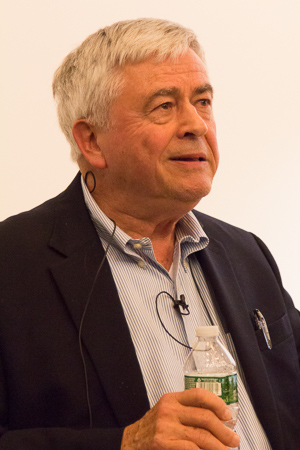
Dr. Essex, PhD, is the Mary Woodard Lasker Professor of Health Sciences at Harvard University. A specialist in immunology and infectious diseases, he studies human retroviruses, with a focus on HIV-1 subtypes. His group’s research on virus evolution is geared toward the development of new vaccines. Dr. Essex holds a doctorate in veterinary medicine from Michigan State University and a Ph.D. from the University of California, Davis.
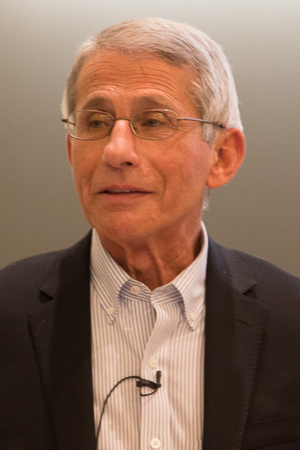
Dr. Fauci, MD, is director of the National Institute of Allergy and Infectious Diseases (NIAID), a position he has held since 1984. He oversees a budget of more than $4 billion for research in HIV/AIDS and other infectious diseases such as tuberculosis, Ebola and Zika. Dr. Fauci holds an M.D. from Cornell University. He is well known for his study of the effect of immunosuppressive agents on the human immune response. He has also conducted pioneering research on HIV’s destruction of humans’ natural defenses.
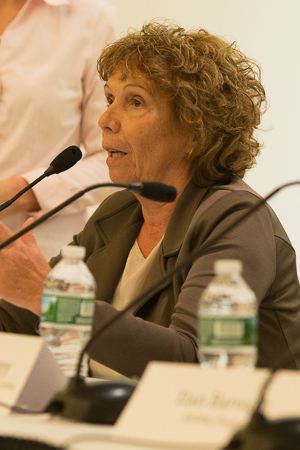
Dr. Franchini, MD, is a Senior Investigator at the Center for Cancer Research of the National Cancer Institute, Vaccine Branch. A hematologist and retrovirologist, she studies HTLV-1 and HIV, and her research has identified viral targets for new vaccines. Dr. Franchini received her medical degree from the University of Modena in Italy.

Dr. Gallo, MD, is director of the Institute of Human Virology, which he co-founded, at the University of Maryland School of Medicine. A pioneer in HIV research, Dr. Gallo co-discovered the human immunodeficiency virus and its role as the cause of AIDS. Before this, he identified the first human retrovirus and one of the few human oncoviruses, HTLV (human T-lymphotropic virus), which can cause leukemia. Dr. Gallo holds an M.D. from Jefferson Medical College in Philadelphia.

Dr. Goff, PhD, is Higgins Professor of Microbiology & Immunology and Biochemistry & Molecular Biophysics at Columbia University. His research specialty is genetic analysis of the M-MuLV and HIV-1 viruses. This research has clarified the functional domains of several viral proteins. Dr. Goff received his Ph.D. from Stanford University.

Dr. Gottlieb, MD, is a practicing internist and immunologist in Los Angeles and an associate clinical professor of medicine at the David Geffen School of Medicine at UCLA. Gottlieb is notable for being the first physician, back in 1981, to report cases of what is now known as AIDS, and he wrote some of the earliest articles on the then-new disease. Gottlieb earned his M.D. from the University of Rochester School of Medicine and studied immunology at Stanford University.

Dr. Gray, MBBCh, is President of the South African Medical Research Council. She is also a leader in the Fred Hutch-based HIV Vaccine Trials Network. Gray is a specialist in the study of HIV in children and adolescents and as transmitted from mother to child. She also researches HIV vaccines and microbicides. Gray earned her medical degree from the University of the Witwatersrand and trained as a pediatrician.
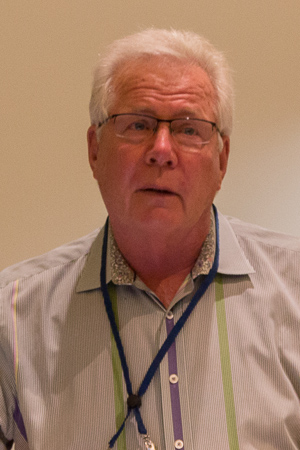
Dr. Greene, MD, PhD, is Director and Senior Investigator at the Gladstone Institute for Virology and Immunology. He studies the molecular mechanisms of HIV pathogenesis and the interaction of human retroviruses, including HTLV, with their hosts, with an eye to developing therapeutic agents. Dr. Greene earned an M.D. and a Ph.D. from the Washington University School of Medicine. He then completed a medical internship and residency at the Massachusetts General Hospital.
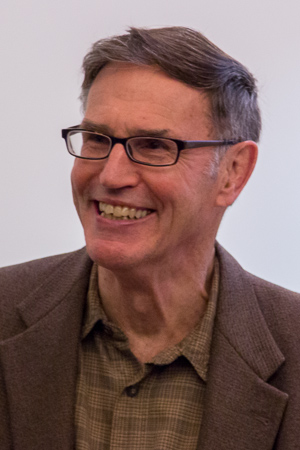
Dr. Haase, MD, is Regents’ Professor of Medicine and Head of the Department of Microbiology at the University of Minnesota. A prominent HIV researcher, Dr. Haase studies HIV transmission in the SIV rhesus macaque model. His group’s goal is to develop new vaccines and microbicides. Dr. Haase earned his M.D. from the Columbia College of Physicians and Surgeons in 1965.

Dr. Hahn, MD, is Professor of Medicine at the Perelman School of Medicine of the University of Pennsylvania. She studies the origin and evolution of HIV and SIV. Dr. Hahn earned her medical degree from the University of Munich, in Germany.
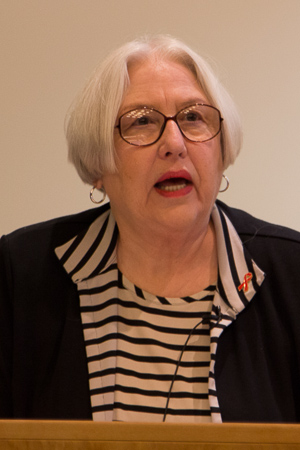
Dr. Harden, PhD, is the Founding Director, Emeritus, of the Office of NIH History and the Stetten Museum at the National Institutes of Health. She was the founder of the office in 1986 and continues to serve there as a volunteer. A historian, Dr. Harden has completed historical studies of AIDS, including the public debate surrounding the disease, and Rocky Mountain Spotted Fever. As founder of the Stetten Museum, she oversaw the collection and exhibition of research instruments and other items. Dr. Harden received her Ph.D. in American History at Emory University.
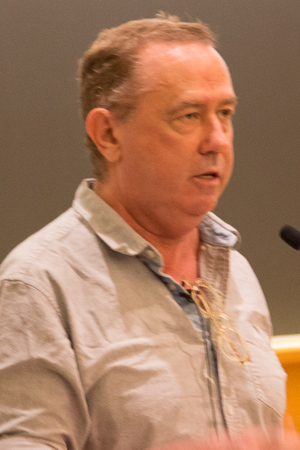
Mark Harrington is an HIV/AIDS researcher, and co-founder (1992) and policy director of the Treatment Action Group (TAG), an HIV/AIDS activist organization. Harrington has been involved with AIDS activism from its early years, joining the seminal AIDS activist group ACT UP in 1988. He organized several major demonstrations at the National Institutes of Health and the Food and Drug Administration. A MacArthur fellow, Harrington has written about AIDS for the Lancet, Science, and other publications.
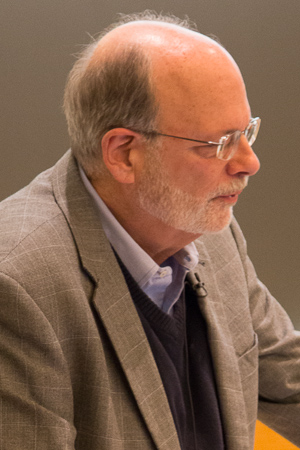
Dr. Haynes, MD, is the Frederic M. Hanes Professor of Medicine and Immunology at the School of Medicine at Duke University, where he also directs the Global Health program. He studies adaptive immune responses to HIV and other infectious diseases, and his lab is working on determining reasons for the absence of broadly neutralizing antibodies in acute HIV infection. Dr. Haynes received his M.D. from the Baylor College of Medicine.
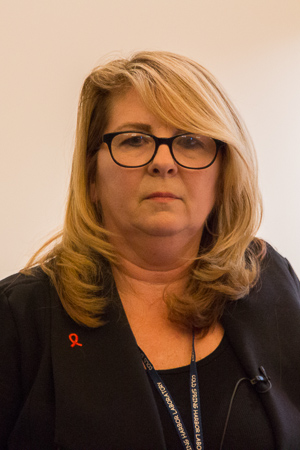
Dr. Hazuda, PhD, is Vice President of Infectious Diseases Discovery at Merck Research Labs and Chief Scientific Officer of the MRL Cambridge Exploratory Science Center. A specialist in infectious disease biology, her research has led to the development of several new medicines to treat diseases like HIV and Hepatitis C. She came to Merck in 1989, and since then has completed pathbreaking work on HIV, including identifying inhibitors of HIV-1 integrase. Her team completed the research behind Isentress, the first-in-class integrase inhibitor. Dr. Hazuda received her Ph.D. from SUNY Stony Brook.
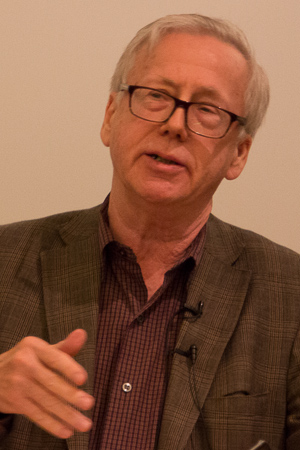
Staffan Hildebrand is a filmmaker who has documented the spread of AIDS in 40 countries, including Uganda, Thailand, Brazil, South Africa, Nigeria, Russia, and the Philippines. His documentaries, totaling close to 700 hours of footage, have included interviews with AIDS patients, physicians and researchers, and activists. His work serves as a unique resource for researchers seeking to learn about the social impact of HIV/AIDS.
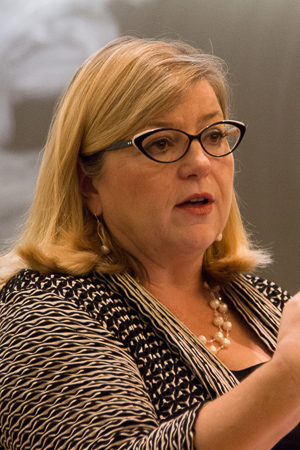
Dr. Hillier, PhD, is a Professor in the Department of Obstetrics, Gynecology & Reproductive Sciences at the Magee-Womens Research Institute & Foundation, University of Pittsburgh. Her specialty is reproductive infectious diseases. Part of her research centers on testing topical microbicides for HIV prevention. As Principal Investigator of the Microbicide Trials Network, she led a global collaborative study of clinical trials to test products that would reduce HIV transmission. Dr. Hillier received her Ph.D. in bacteriology and public health from Washington State University.

Dr. Ho, MD, is Senior Physician and Irene Diamond Professor at The Rockefeller University. His laboratory studies the pathogenesis of HIV infection, focusing now on developing new HIV vaccines and prevention strategies. An AIDS researcher for 34 years, Dr. Ho has published over 400 papers on the disease. He was a pioneer in the area of quantitation of HIV. He was Time magazine’s Man of the Year in 1996 for his work on new treatments for the disease. Dr. Ho received his M.D. from Harvard Medical School in 1978.
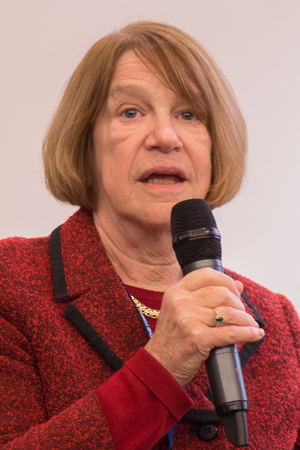
Dr. Lehrman, MD, is Global Director of Scientific Affairs for Antivirals at Merck Research Laboratories. Before coming to Merck in 2007, Dr. Lehrman directed the Therapeutic Research Program in the Division of AIDS at the National Institutes of Health. She earned her medical degree from Alpert Medical School at Brown University and completed an internship and residency at Massachusetts General Hospital.

Dr. Lewin, PhD, is a professor at the University of Melbourne and director of the Peter Doherty Institute for Infection and Immunity. A specialist in infectious diseases, she is known for her research into many aspects of HIV, including pathogenesis. Her laboratory currently studies, among other things, HIV latency reversing agents and HIV and HBV co-infection. Dr. Lewin received her PhD in virology at the Burnet Institute in Melbourne.
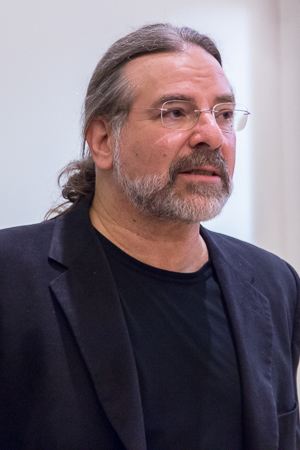
Dr. Lifson, MD, is director of the AIDS and Cancer Virus Program at the National Cancer Institute at Frederick, as well as a principal investigator in the Retroviral Pathogenesis Section. Involved in AIDS research since 1983, he created the first program in the United States to prevent transmission of AIDS through laboratory transfusions. His current research focuses on quantitative and immunological methods for understanding retroviruses and working on prevention and treatment of AIDS. Dr. Lifson received his M.D. from Northwestern University Medical School in 1982. He then completed a residency and research fellowship at Stanford University School of Medicine.
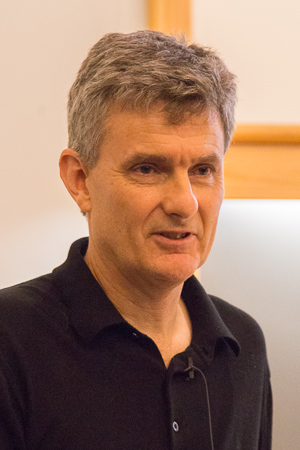
Dr. Malim, PhD, is Professor of Infectious Diseases at King’s College London. His laboratory studies HIV replication and pathogenesis using a variety of approaches, from molecular genetic to cell, biochemical, structural, and bioinformatics. His current work focuses on host-virus interactions and anti-viral resistance. Dr. Malim received his D.Phil. in biochemistry from the University of Oxford in 1987.

Dr. Martin, PhD, MBA, is Executive Chairman of Gilead Sciences, where he previously held the positions of chairman, CEO, and president. Gilead is a biopharmaceutical company with a pipeline of innovative medicines for HIV/AIDS, cancer, and a number of other areas. Dr. Martin has been the president of the International Society for Antiviral Research and served on the Presidential Advisory Council on HIV/AIDS. Before joining Gilead in 1990, Dr. Martin held leadership positions at both Bristol-Myers Squibb and Syntex Corporation. He earned a Ph.D. in organic chemistry from the University of Chicago. He also holds an MBA from Golden State University.
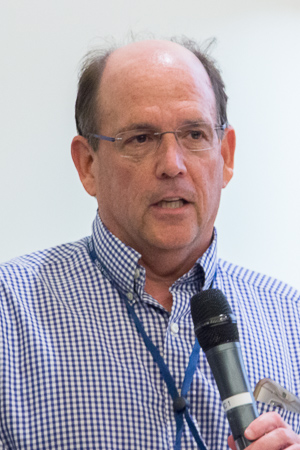
Dr. Mellors, MD, is Professor of Medicine at the University of Pittsburgh, where he is also chief of the infectious diseases division and the Endowed Chair for Global Elimination of HIV and AIDS. His research focuses on resistance to antiretroviral drugs for HIV. He studies the relationship between plasma viremia and HIV disease progression to AIDS. He has contributed to developing the first antiretroviral combinations that led to sustained suppression of viremia. Dr. Mellors received his M.D. from Dartmouth Medical School in 1978 and completed his residency and fellowship training at Yale-New Haven Hospital and Yale University School of Medicine, respectively.
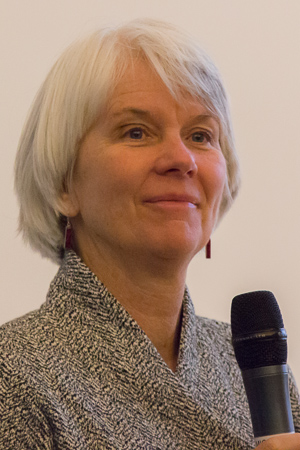
Dr. Overbaugh, PhD, is a member of the Human Biology and Public Health Sciences divisions at the Fred Hutchinson Cancer Research Center. Her research focuses on the mechanisms of viral pathogenesis, particularly those of FeLV, SIV and HIV. Specifically her group is interested in how these viruses remain so persistent after infection. Dr. Overbaugh received her Ph.D. in biochemistry from the University of Colorado, Boulder, in 1983.
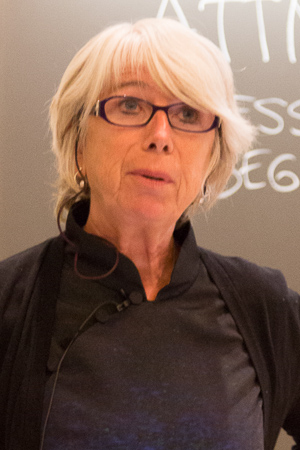
Dr. Peeters, PhD, is director of research at IRD, focusing on translational research for HIV and other infectious diseases. Her team studies the genetic diversity of HIV, having analyzed various strains of the virus in West Africa and contrasting them with those of the United States and Europe. Her unit is a World Health Organization reference laboratory for HIV drug resistance.

Dr. Perelson, PhD, is a Senior Fellow at the Los Alamos National Laboratory in Mathematical and Theoretical Biology. He is also an External Professor and Science Board member at the Santa Fe Institute. He is internationally recognized for his research on modeling infectious diseases, including the Hepatitis C virus and HIV/AIDS. His work on HIV has included mathematically modeling within-host dynamics and also modeling HIV-1 infection and drug therapy. Dr. Perelson received his Ph.D. in biophysics from the University of California at Berkeley in 1972.
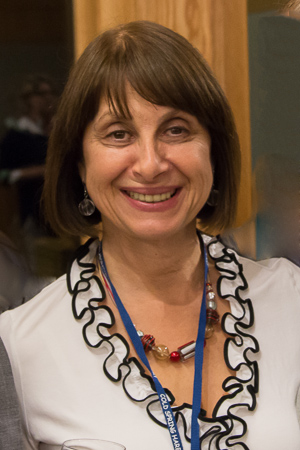
Ludmila (Mila) Pollock is the Executive Director of the Library & Archives at Cold Spring Harbor Laboratory (CSHL). She has led the Library & Archives since 1999, as well as the Genentech Center since 2006. The CSHL Library is a state-of-the-art library whose mission is to serve the research needs of the international scientific community at CSHL. The CSHL Archives is internationally recognized for building and promoting extensive collections of original documents pertaining to the history of molecular biology and genetics. Under Mila Pollock's leadership, the CSHL Library & Archives has been awarded more than $2 million in grant support. Mila has conceived and spearheaded numerous special projects, including the acclaimed CSHL Oral History Project: “Talking Science” (http://oralhistory.cshl.edu), for which she interviewed more than 200 prominent international scientists in molecular biology, genetics, and biotechnology. Mila initiated the History of Science series of international meetings at CSHL, each of which is focused on the origins and development, as well as, current research in a specific field in life sciences. She follows her mission to preserve and distribute knowledge of the history and future of science and medicine through national and international talks, special projects, and exhibitions.
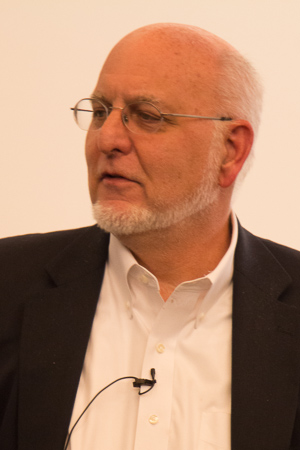
Dr. Redfield, MD, is Professor of Medicine at the Institute of Human Virology, University of Maryland School of Medicine. A renowned virologist and expert on HIV and AIDS, he and his research team were the first to demonstrate that HIV could be transmitted heterosexually. In addition, he created the staging system for HIV infection, now standard in patient assessment. His current research focuses on targeting host cell pathways for develop new therapies. He also oversees a clinical program providing HIV care to over 4,000 patients in the Baltimore-Washington area. Dr. Redfield earned his M.D. from Georgetown University School of Medicine.

Dr. Rice, PhD, is a virologist and Professor of Virology and Microbiology at Baylor College of Medicine. He has been involved in investigating the regulation of HIV since the late 1980’s and showed the regulation of HIV transcription via the viral transactivator protein Tat. In his current lab, the focus is on the regulation of gene expression during viral infection and the role of Tat in that process. Dr. Rice earned his PhD from Brandeis University, MA.

Dr. Richman, MD, is a virologist and Distinguished Professor of Pathology and Medicine at the UCSD. He also holds the Florence Seeley Riford Chair in AIDS Research. He is the Director of the Center for AIDS Research at UCSD, and Director of the UC San Diego AIDS Research Institute. Dr. Richman was the first to discover HIV drug resistance as well as the dynamics of the neutralizing antibody response to HIV. His lab is currently focused on the latent HIV reservoir and methods to destroy this reservoir. The lab is also investigating the cell mediated and neutralizing antibody immune responses to HIV and the response of the virus. Dr. Richman earned his MD at Standford University.

Dr. Robinson, PhD, is the Chief Scientific Officer of GeoVax, Inc., and Emeritus Professor of Microbiology and Immunology at Emory University School of Medicine. She is the developer of GeoVax's HIV/AIDS vaccine technology and is one of the world's leaders in HIV/AIDS vaccine research. She is a co-founder of GeoVax and has served as chief of its scientific advisory board since formation of the company in 2001. From 1999 to February 2008, Dr. Robinson served as the Asa Griggs Candler Professor of Microbiology and Immunology at Emory University in Atlanta, Georgia, and from 1998 to February 2008 as Chief, Division of Microbiology and Immunology, Yerkes National Primate Center and Professor at the Emory University School of Medicine. She was Professor, Department of Microbiology & Immunology, at the University of Massachusetts Medical Center from 1988 to 1997 and Staff, then Senior, then Principal Scientist at the University of Massachusetts Worcester Foundation for Experimental Biology from 1977 to 1987
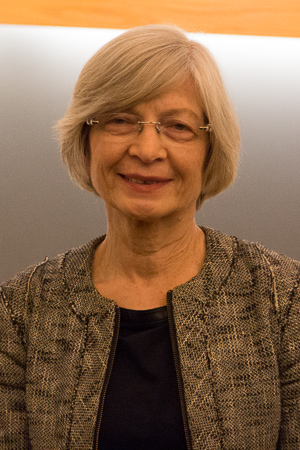
Dr. Ruprecht, MD, PhD, is the Director of Texas Biomed AIDS Research Program at the Texas Biomedical Research Institute and Scientist at Southwest National Primate Research Center, Virology & Immunology Infectious Disease Unit. Dr. Ruprecht was first to show AZT was safe and efficacious in animal models. Her work is ongoing today and revolves around attempting to develop vaccines to block HIV at sites of entry and to create multi-component vaccines. Dr. Ruprecht earned her MD at the University of Miami School of Medicine, FL and PhD Columbia University, NY.
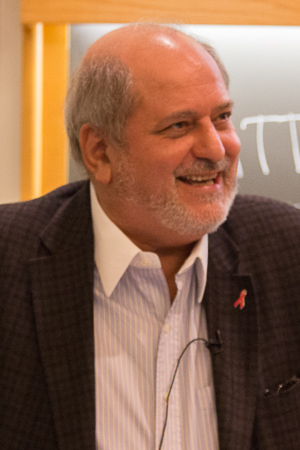
Dr. Schinazi, PhD, is a biochemist and the Frances Winship Walters Professor of Pediatrics and the Director of the Laboratory of Biochemical Pharmacology at Emory University. He is also a Senior Research Career Scientist at the Atlanta VA and the co-Director of the Virology and Drug Discovery Core at the Emory University Center for AIDS Research. Dr. Schinazi has been credited with developing or helping to develop 6 drugs which are commonly used by HIV infected people. His current research is targeted towards developing treatments for infections caused by HIV, Hepatitis B, Hepatitis C, XMRV, herpes and dengue fever viruses. Dr. Schinazi earned his PhD in Chemistry from the University of Bath, England.

Dr. Shaw, MD, PhD, is Professor of Medicine at the Perelman School of Medicine at UPenn. While working with Dr. Robert Gallo at NIH, he developed the first molecular clones of HIV-1 and discovered the likelihood of rapid genetic change in the HIV virus. His current research involves investigating the mechanisms for HIV-1 transmission, persistence and pathogenesis, with a long term aim for developing effective vaccines against HIV. Dr. Shaw is an international leader in human and simian immunodeficiency virus research and has made groundbreaking contributions to this field for over two decades. He has also contributed significantly to the study of the transmission of human infectious pathogens from non-human animals.
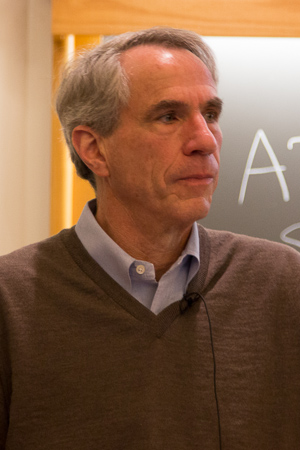
Dr. Siliciano, MD, PhD, is a molecular biologist and geneticist, a Professor of Medicine at Johns Hopkins University School of Medicine and an HHMI Investigator. Dr. Siliciano began to study HIV in the mid 1980’s and in 1997 his research group found a population of HIV-infected memory T-cells that remained in patients despite antiviral drug therapy. The presence of this latent reservoir means the infection can’t be cured unless it’s eliminated. The focus of Dr. Siliciano current work is to find drugs that will work to eliminate this reservoir and methods to measure the size of the reservoir. Dr. Siliciano earned his MD and PhD from Johns Hopkins University, MD.

Dr. Skalka, PhD, is a molecular biologist and geneticist. She is Senior Advisor to the President and Professor at the Fox Chase Cancer Center in Philadelphia. After working on bacteriophage under Alfred Hershey at Cold Spring Harbor Laboratory she left in 1969 for the Roche Institute for Molecular Biology and eventually she turned her attention to retroviruses. Currently Skalka studies molecular aspects of retroviral replication and hopes to uncover mechanisms of retroviral DNA integration. She has become interested in virally coded integrase, which catalyzes the integration of retroviral DNA into the host cell’s genome. Considering that stable integration of viral DNA into the host cell genome is essential for replication of retroviruses, her studies are important in developing antiviral drugs to treat AIDS. Dr. Skalka earned her PhD from NY University Medical School, NY.
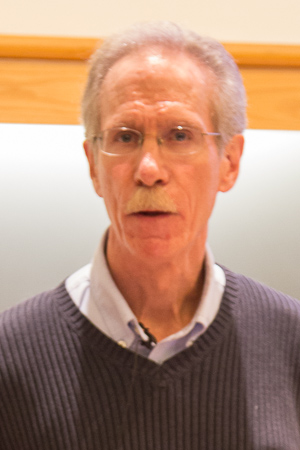
Dr. Sodroski, MD, is a Professor in the Department of Pathology, Harvard Medical School; Professor in the Department of Immunology and Infectious Diseases, Harvard School Of Public Health; and Associate Director, Harvard Medical School Center for AIDS Research, Dana-Farber Cancer Institute. Dr. Sodroski first showed that HIV was involved in encoding the transactivating protein Tat and the Rev gene which effects the HIV replication cycle. He was also involved in developing the SHIV model in monkeys. His ongoing work focuses on understanding the early phases of HIV infection. Dr. Sodroski earned his MD at Jefferson Medical College, PA.
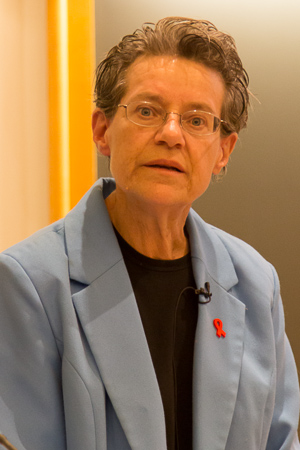
Dr. St. Clair, PhD, is a Clinical HIV virologist at ViiV Healthcare . Marty first observed the antiretroviral activity of AZT in November of 1984, the first drug approved for use in HIV/AIDS. After joining Burroughs Welcome in 1976 as a herpes virologist Marty was instrumental in discerning the mechanism of action of acyclovir. She worked with herpes viruses until 1984, when she switched to HIV. She has worked on HIV research at Burroughs Wellcome, Glaxo Wellcome, GlaxoSmithKline and now ViiV Healthcare, emphasizing new drug development and understanding resistance.
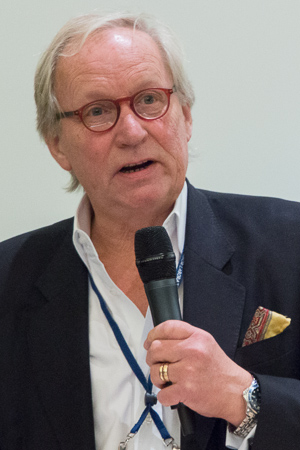
Dr. Vahlne, MD, PhD, is a Swedish Medical Doctor and Clinical Virologist, a Senior Professor at the Karolinska Institutet, Director of the Karolinska GVN Center of Excellence, and a member of the President’s Advisory Board for the National Virus Reference Laboratory at the University College Dublin. From 1972 to 1986 Dr. Vahlne’s research focused around the neuro-pathogenesis of herpes simplex virus infections. He thereafter switched to mainly work on human lentiviruses, in particular HIV. Dr. Vahlne earned his MD and PhD at the University of Gothenburg, Sweden.

Dr. Varmus, MD, is the Lewis Thomas University Professor at Weill Cornell Medical College, Senior Associate at the New York Genome Center, the immediate past Director of the National Cancer Institute, and a Nobel Laureate in Medicine or Physiology. His research career has focused on retroviruses and their replication mechanisms which cause cancer. Along with Michael Bishop he was awarded the Nobel Prize for Medicine or Physiology in 1989 for their discovery of the cellular origin of retroviral oncogenes. Among other significant achievements while directing the NIH, Dr. Varmus is credited with leading important clinical and AIDS research; for policy statements about stem cell research, cloning of organisms, gene therapy, and patenting; and for promoting global health research. Dr. Varmus has always maintained an active research laboratory, even while in leadership administrative positions and currently his laboratory at Weill Cornell Medical College is investigating lung cancer and the role played by mutations of the epidermal growth factor receptor.
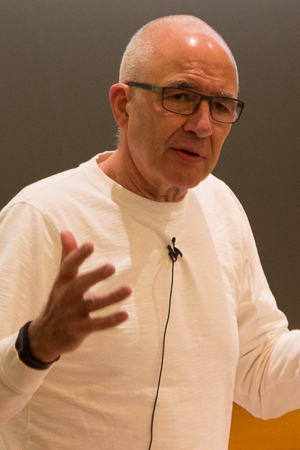
Dr. Volberding, MD, is the Director of the UCSF AIDS Research Institute and Director of Research for UCSF Global Health Sciences, as well as co-director of the Center of AIDS Research at UCSF, the Gladstone Institute of Virology and Immunology and Director of Global Health for the UCSF Clinical and Translational Science Institute. In 1983 he established the first inpatient ward for AIDS sufferers and worked on early antiretroviral therapy clinical trials as well as clinical trials for AIDS related cancers. Dr. Volberding currently maintains an active HIV outpatient practice and serves as the Clinical Editor in Chief for the Journal of the Acquired Immunodeficiency Syndromes. Dr. Volberding earned his MD at the University of Minnesota, MN.

Bruce Walker, MD, is the Director of the Ragon Institute of MGH, MIT and Harvard University, HHMI Investigator, and a founding scientist at the KwaZulu-Natal Research Institute for Tuberculosis and HIV (K-RITH), Nelson Mandela School of Medicine , University of KwaZulu-Natal, South Africa. Dr. Walker began attempting to understand how the immune system unsuccessfully fights the HIV virus without treatment. In 1987 he was able to show T-cells were actively fighting the virus but over time the immune system was defeated by the virus. His ongoing work is aimed at discovering how the body can mount a durable immune response that controls HIV infection in some patients, the genetic basis for this phenomenon, as well as the development of an HIV vaccine. Dr. Walker earned his MD at Case Western Reserve University, OH.

In 1962, James D. Watson shared the Nobel Prize for Physiology or Medicine with Francis Crick and Maurice Wilkins for their discovery of the double-helix structure of deoxyribonucleic acid (DNA) in 1953.
From 1956 to 1976, Watson was a faculty member in the Biology department at Harvard University, where the focus of his research was RNA and its role in the transfer of genetic information.
One of Watson's other major interests is education. His first textbook, Molecular Biology of the Gene, set new standards for biology textbooks, and it was followed by Molecular Biology of the Cell, and Recombinant DNA.
Watson has also played a significant role in the development of science policy, from the War on Cancer, through the debates over the use of recombinant DNA, to promoting the Human Genome Project. From 1988 to 1992, he ran the Human Genome Project at the National Institutes of Health while still directing Cold Spring Harbor Laboratory (CSHL).
Watson has had a long association with CSHL, beginning as a student in a popular summer course on phage genetics. Watson took over the directorship of the Lab in 1968. He is currently Chancellor Emeritus of CSHL. Since 2008 his research interests have moved to the curing of cancer focusing on the biochemistry of cancer cells as opposed to their genetic origins. In a recent paper, Jim sets forth a novel hypothesis regarding the role of oxidants and antioxidants in cancers that are currently incurable, notably in late-stage metastatic cancers.

Dr. Weiss, MD, PhD, is a British Molecular Biologist and Professor of Viral Oncology at University College London. Dr. Weiss won the Ernst Chain Prize in 2007 for his research into HIV/AIDS. Dr. Weiss has focused his research efforts on retroviruses such as HIV and identified CD4 as the binding receptor for HIV as well as creating HIV screening tests and determining how antibodies neutralize the virus. His current work focuses on the immune response to HIV infection and reasons behind the failure to development a successful vaccine. Dr. Robin Weiss earned his Ph.D. in Biology from University College London and his MD from Uppsala University, Uppsala, Sweden.
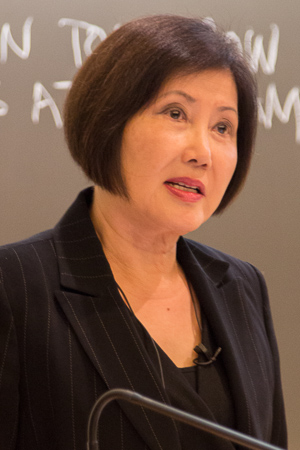
Dr. Wong-Staal, PhD, is a Chinese-American virologist and molecular biologist and is co-founder and the Chief Scientific Officer of iTherX Pharmaceuticals. At the National Cancer Institute, Dr. Wang-Staal, along with Dr. Gallo, identified the HIV virus as the cause of AIDS, and cloned and mapped HIV. In 1990 she led a research effort to examine the effect of the Tat protein in HIV infected cells on the presence of Kaposi’s Sarcoma lesions. After moving to UCSD in 1990 she was named chair of UCSD’s new Center of AIDS Research in 1994 where she worked on gene therapy to treat HIV in stem cells. Since retiring from UCSD Dr. Wong-Staal has been the Chief Scientific Officer at iTherX Pharmaceuticals.
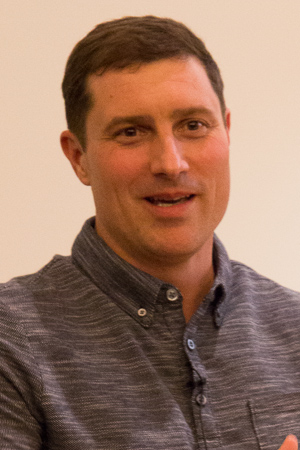
Dr. Worobey, PhD, is a Canadian Molecular Biologist and the Louise Foucar Marshall Science Research Professor and Professor and Head of the Department of Ecology and Evolutionary Biology at the University of Arizona. Dr. Worobey uses evolutionary approaches to understand how RNA viruses and retroviruses like HIV and Influenza evolve and are spread. In 2007 Dr. Worobey and his colleagues elucidated the timeline for the spread of HIV from Africa, via Haiti, to the US in 1969. His work is ongoing to investigate how the AIDS virus crossed to humans and spread as well as the rate and mode of evolution of the virus. Dr. Michael Worobey earned his PhD from the Department of Zoology at the University of Oxford.
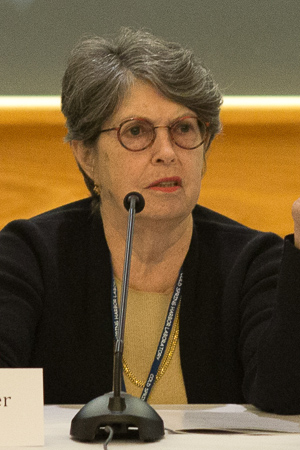
Dr. Zolla-Pazner, PhD, is an immunologist working at the Mount Sinai School of Medicine, NY. She was among the first scientists to participate in describing the immunological abnormalities in patients with a disease that would become known as AIDS. Early on her lab noted the hyperactivation of b-lymphocytes in HIV+ patients and developed ways to generate anti-HIV human monoclonal antibodies, antibodies that can be used to neutralize the infectivity of the virus. Her work continues today and focuses on the immunologic abnormalities in HIV as well as the development of an HIV vaccine. Dr. Susan Zolla-Pazner earned her Ph. D. in Medical Microbiology at the University of California Medical Center in San Francisco.